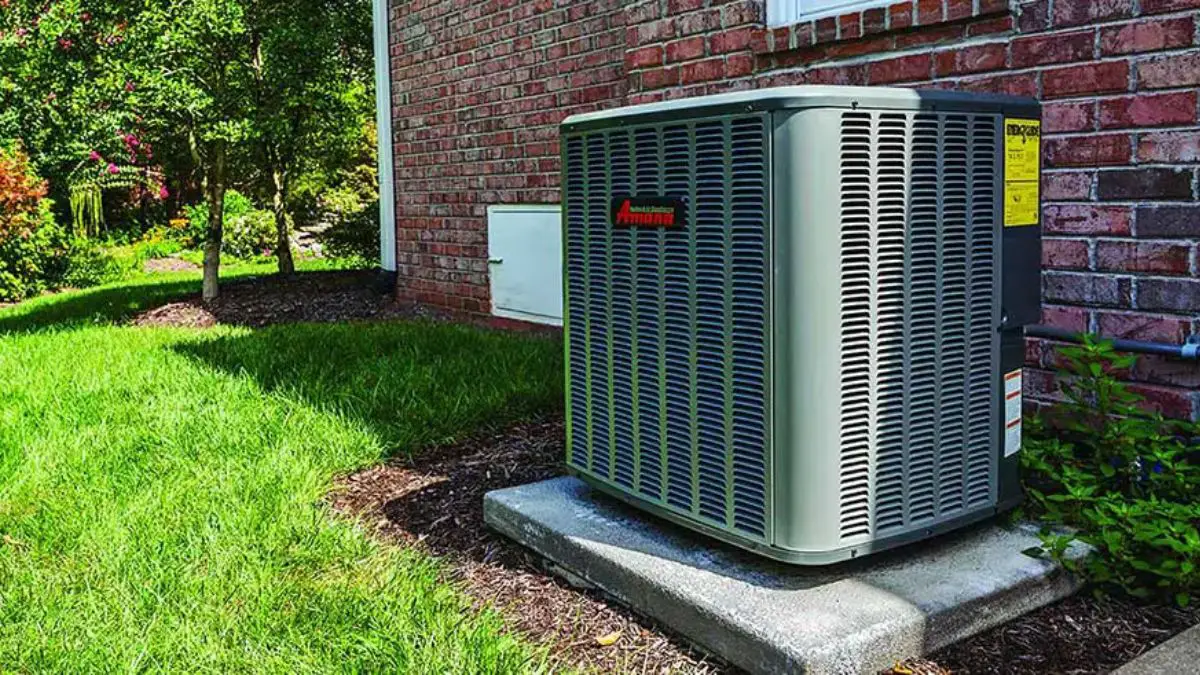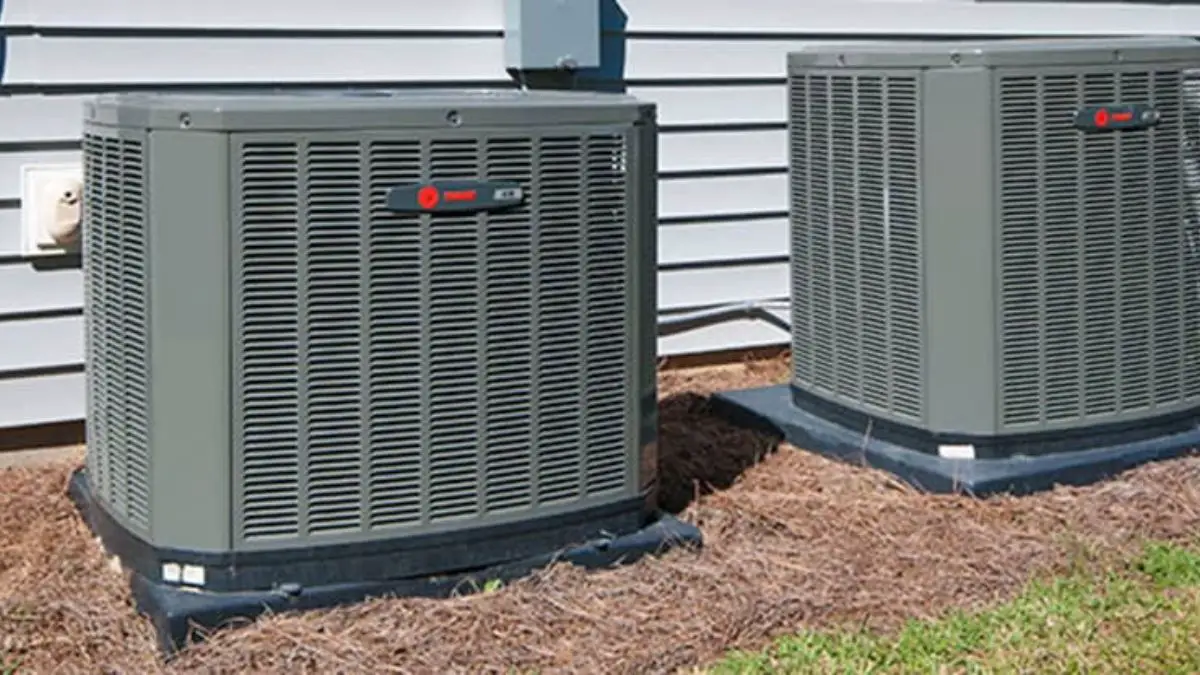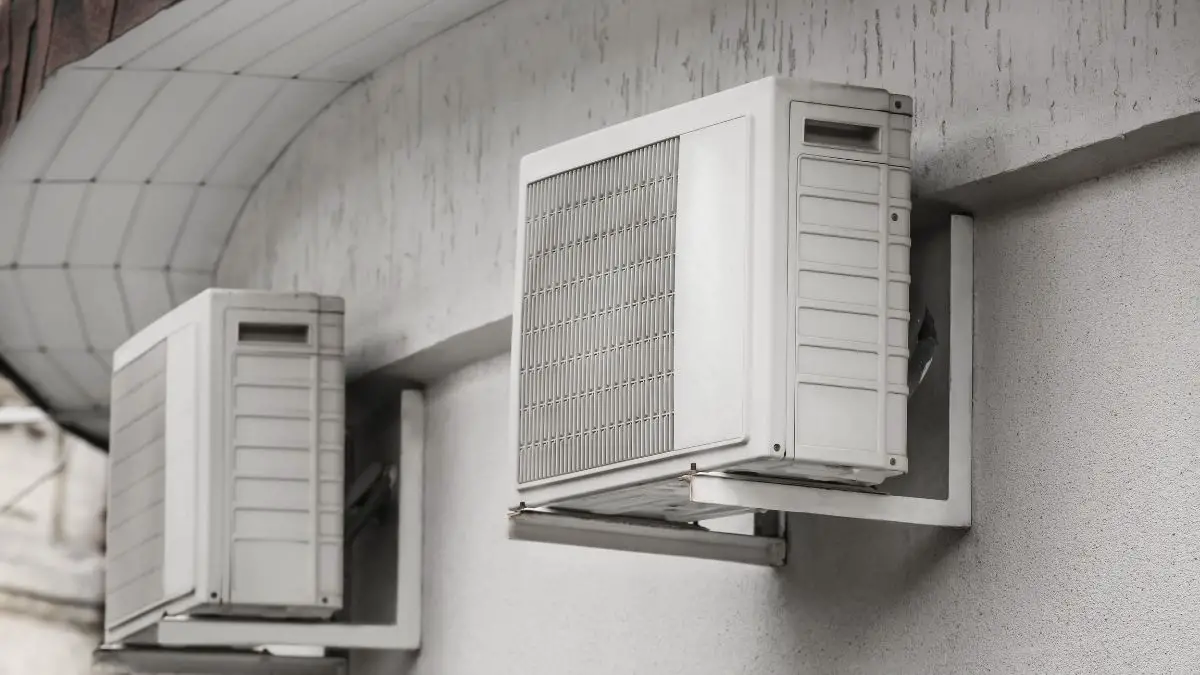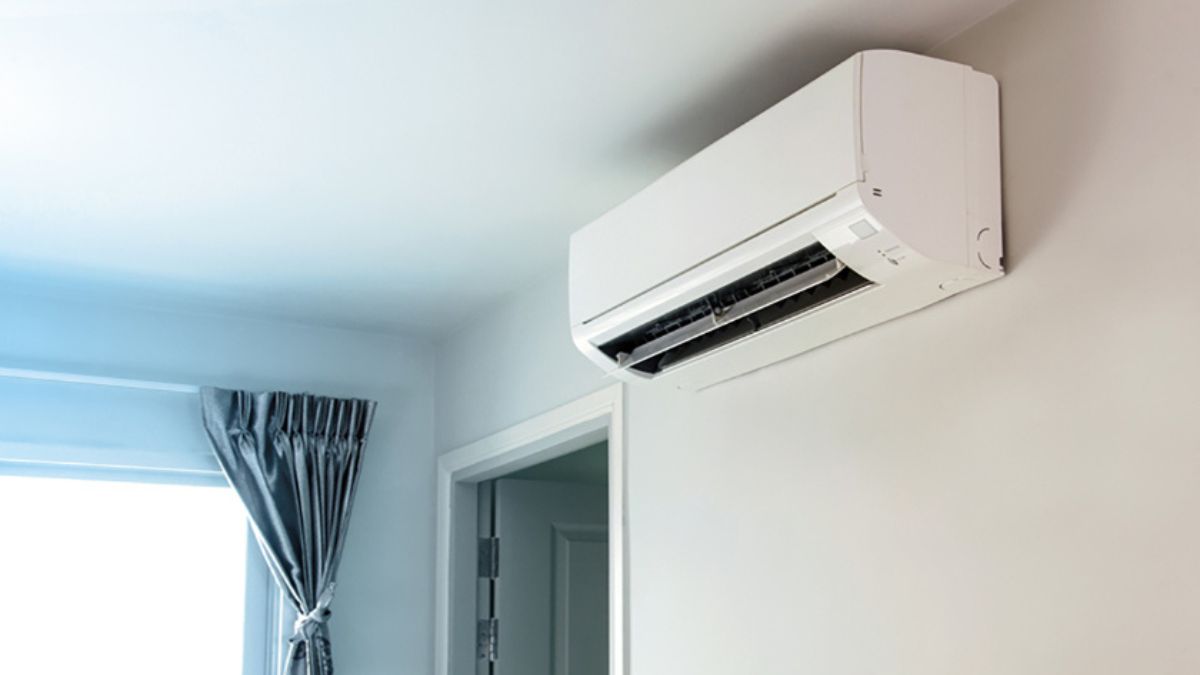When searching for a good SEER rating for a heat pump in your home, there are many factors to consider. We all know these are important, but how do you separate fact from fiction regarding this crucial component of your HVAC system?
We’ll debunk some of the common myths surrounding good SEER ratings and cost-saving heat pumps and provide the facts you need to make an informed decision.
According to the US Department of Energy (DOE), the minimum SEER rating in 2023 is 14 SEER. However, SEER ratings are available from 14 to 26 SEER. A good SEER rating for a heat pump is 14 to 18 SEER and 18 to 26 SEER for ductless mini-split systems.
A good SEER (Seasonal Energy Efficiency Ratio) rating is essential for any homeowner looking to save money and reduce their impact on the planet. This rating measures the efficiency of cost-saving heat pumps, including how much cooling output it provides per unit of energy consumed.
| Key Takeaways |
|---|
| The minimum energy efficiency standard for a ducted heat pump and central air conditioner is 14 SEER as of 2023. |
| Conduct thorough research on different brands and models of heat pumps to find one with a good SEER rating and features that meet your needs. |
| Consider factors such as climate and weather conditions, size and capacity, and your budget when choosing a heat pump. Note that colder climates in zones 6 to 8 may not be suitable for heat pumps. |
| Prioritize long-term savings over upfront costs when making your decision. |
| Regularly maintain and service your heat pump to ensure maximum efficiency and performance over time. |
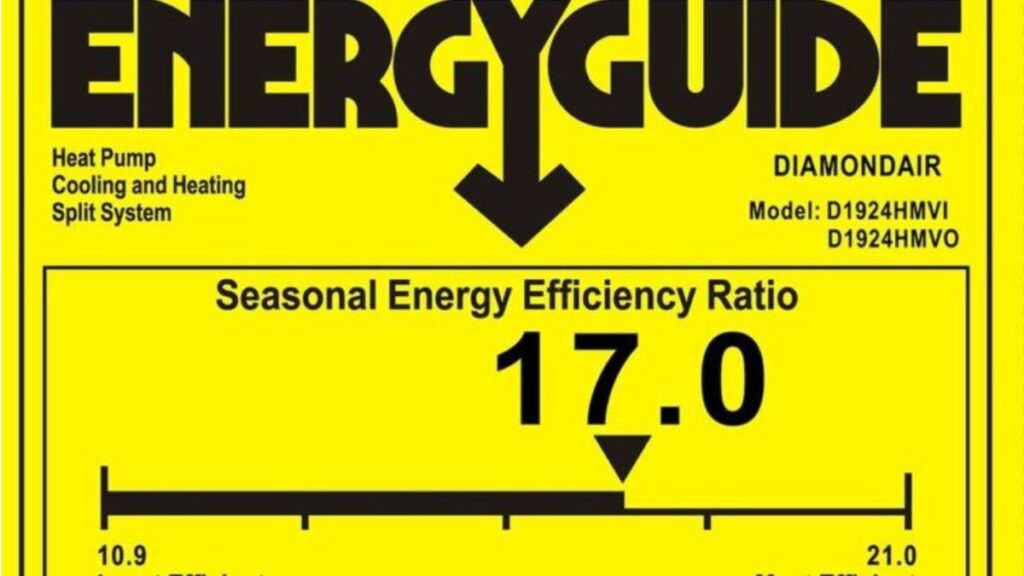
Understanding SEER Rating for a Heat Pump
When it comes to understanding the importance of a good heat pump efficiency rating, it’s important first to understand what this rating actually means.
What is a SEER rating?
SEER stands for Seasonal Energy Efficiency Ratio, which measures how efficiently your heat pump can cool your home over the entire cooling season. It’s essentially a ratio of the amount of cooling output (in British Thermal Units, or BTUs) divided by the amount of energy consumed (in watt-hours).
The higher the SEER rating, the more efficient your heat pump is at cooling your home and reducing energy consumption. For example, a ducted heat pump with an 18 SEER rating will be more efficient than one with a minimum SEER rating of 14.
How is the SEER rating calculated?
The SEER rating is calculated by dividing the cooling output of an air conditioner or heat pump over a typical cooling season by the total electric energy input during the same period. The higher the SEER rating, the more efficient your system is at converting electricity into cool air.
It’s actually a bit more complicated than simply dividing cooling output by energy consumption. In fact, the SEER rating is calculated based on various factors, including the temperature conditions and humidity levels in your area.
A standard temperature profile calculates the SEER rating, assuming that the heat pump is used in a region with a moderate climate. This temperature profile is then used to measure the standard efficiency heat pump rating over the entire cooling season, usually from May through September.
Overall, it’s a crucial measure of heat pump efficiency and energy consumption. By understanding how this rating is calculated and what it means, you can make a more informed decision when choosing a heat pump for your home.
What is a good SEER rating for heat pumps?
A good SEER rating for heat pumps is typically between 14 to 18. The higher the SEER rating, the more efficient and cost-effective the heat pump will operate.
Mini-splits offer higher SEER ratings and can be more energy efficient than traditional systems. Ductless mini-splits are often used in commercial spaces, condos, apartments, townhomes, or homes with an open floor plan where individual climate control zones are needed.
What is a good SEER rating for mini splits?
A good SEER rating for ductless mini splits is 18 to 26. Ductless mini-split systems are more efficient because they are ductless, allowing the room receives 100% of its output. Ducted heat pump systems can lose 30% or more of their output through gaps in ductwork traveling to the room.
Multi-zone AC systems are becoming increasingly popular due to their ability to allow for climate control zoning and overall versatility.
Importance of a Good SEER Rating for a Heat Pump
A good SEER rating for a heat pump can bring a wide range of benefits, including energy efficiency, cost savings, environmental impact, and long-term benefits. Let’s explore each of these in more detail.
Heat pump efficiency and cost savings:
A higher SEER rating means your heat pump will consume less energy to cool your home, lowering electric bills. This can make a significant difference over time, especially during hot summer when you run your heat pump more frequently. Investing in a heat pump with a higher SEER rating can save hundreds of dollars per year on your electricity bills.
Environmental impact:
With rising concerns over climate change, it’s more important than ever to reduce our carbon footprint and lessen our environmental impact.
Choosing a heat pump with a high SEER rating can help achieve this goal, as it reduces energy usage and lowers greenhouse gas emissions. This can help to preserve natural resources and create cleaner air for everyone.
Long-term benefits:
Investing in a heat pump with a good SEER rating also has long-term benefits that extend beyond energy savings and environmental impact. A reliable heat pump with a high SEER rating will last longer and require fewer repairs over time. This means you can enjoy consistent comfort in your home without worrying about frequent breakdowns or expensive maintenance costs.
By understanding the importance of a good SEER rating for a heat pump, you can make an informed decision when choosing a new efficient unit for your home. Not only will this lead to immediate cost savings and environmental benefits, but it will also provide long-term comfort and peace of mind.
Good SEER Rating for a Heat Pump: Myths vs. Facts
There are several myths surrounding the ideal SEER rating for heat pumps. Here are a few:
| Myth | Higher SEER ratings always mean better performance. |
| Fact | While higher SEER ratings generally indicate a high-efficiency air conditioner or heat pump, there are other factors to consider when choosing a heat pump, such as the climate zone you live in and your heating and cooling needs. |
| Myth | The highest SEER rating is always the best choice. |
| Fact | While a high SEER rating is desirable for a heat pump or reliable air conditioner efficiency, it may not be the best choice for your home if you don’t use your heat pump frequently. |
| Myth | Heat pumps with lower SEER ratings are not worth buying. |
| Fact | If properly sized and installed, air-source heat pumps with lower SEER ratings can provide efficient heating and cooling. |
| Myth | The SEER rating is the only important factor when choosing a heat pump. |
| Fact | Even air-source heat pumps with lower SEER ratings can provide efficient heating and cooling if properly sized and installed. |
| Myth | A higher SEER rating means the heat pump will last longer. |
| Fact | The SEER rating measures heat pump efficiency, not durability. A heat pump’s lifespan depends on many factors, including maintenance, usage patterns, and environmental conditions. |
| Myth | Upgrading to a high SEER-rated heat pump will always save you money. |
| Fact | While a high SEER-rated heat pump can be more energy-efficient, it may not always result in cost savings. Factors such as climate, insulation, and usage patterns can all affect your electric bills. |

Factors that Affect Heat Pump SEER Ratings
Several factors can affect the SEER rating of a heat pump. Understanding these factors is crucial when selecting a new efficient unit for your home. Here are some of the key factors that can impact heat pump efficiency:
Size and capacity of the unit:
The size and capacity of the heat pump can significantly affect its SEER rating. Cooling systems that are too small for your home will have to work harder to provide cooling, leading to higher energy consumption.
On the other hand, central systems that are too large for your home will cycle on and off frequently, leading to inefficiency and higher energy bills.
Brand and model:
Different brands and models of cost-saving heat pumps can vary in efficiency. Some brands are known for producing high-efficiency systems, while others may not meet the same standards. Researching different brands and models is essential to find one with a good SEER ratio that fits your needs.
Climate and weather conditions:
The climate and weather conditions in your area can also impact the SEER rating of your heat pump. If you live in a hot and humid climate, the outdoor unit of your split-type AC system will have to work harder to provide cooling, which can lower overall efficiency. Similarly, if your area experiences large temperature swings, this can also affect the SEER rating.
HVAC Industry SEER Rating Standards
The industry standards and regulations can provide valuable guidance when selecting a heat pump with a good SEER rating. Additionally, experts in the field can provide recommendations and insights to help you make an informed decision. Let’s explore these factors further.
Industry standards and regulations:
The minimum SEER rating for cost-saving heat pumps in the United States is 14. However, many models are available with much higher ratings, ranging from 14 to 26. It’s important to remember that the higher the SEER rating, the more energy-efficient the air conditioning unit will be, which translates to lower utility bills and a reduced carbon footprint.
Recommendations from experts:
HVAC professionals and industry experts can provide valuable insights into the size of heat pump and efficiency for your individual specific needs. Experts can also guide you in selecting efficient systems with the greatest heat pump efficiency and lowest electricity costs.

SEER vs SEER2 Rating
SEER and SEER2 are the buzzwords that keep popping up regarding air conditioning and heat pump energy efficiency ratings. But what exactly do these terms mean? Let’s dive into the nitty-gritty.
As we stated earlier, SEER stands for Seasonal Energy Efficiency Ratio and is the rating system used to determine the energy efficiency of air conditioners and heat pumps.
But wait, there’s more! SEER2 is the upgraded version of SEER, which became the new standard energy efficiency rating system for standard efficiency heat pumps as of January 1, 2023. All cooling systems manufactured from 2023 onwards will carry a SEER2 rating.
So, how are these ratings calculated, you ask?
Both SEER and SEER2 use the same calculation method. They measure the total amount of heat removed from a home during a typical annual cooling season (expressed in British thermal units) divided by the total electrical energy used by the unit during the same cooling season (expressed in watt-hours).
However, the testing procedures for SEER2 ratings have been updated to account for actual field conditions. Manufacturers are now required to test systems under higher external static pressure, resulting in a more accurate representation of a unit’s energy consumption in the real world.
Comparing SEER and SEER2 is a bit like comparing apples and oranges. While the SEER2-rated system is roughly 4.71% more efficient than a SEER system with the same rating number, a unit’s SEER rating under the new testing procedures is approximately 4.5% lower than the rating it would have received under the old testing requirements. Confusing, we know.
To put it into perspective, imagine upgrading your unit from a SEER-rated system to a SEER2-rated system. This upgrade can equate to a whopping 4.71% increase in standard efficiency heat pumps, translating into significant energy cost savings over time.
Your Home Needs to be Energy Efficient Too
When considering a good SEER rating for a heat pump, it’s important to recognize that your home’s energy efficiency plays a significant role in determining the ideal rating. Here’s why:
An energy-efficient home operates as a system where all components work together to reduce energy consumption and lower utility bills. Your home’s insulation, windows, doors, and air ducts contribute to its overall heat pump efficiency.
So, if your home is poorly insulated or has drafty windows and doors, even the most efficient heat pump won’t impact your energy bills much.
On the other hand, if you have a well-insulated home with energy-efficient windows and doors, choosing a heat pump with a high SEER rating can help you save even more money on your energy bills.
In addition to reducing current energy costs, an energy-efficient home can improve indoor comfort by maintaining consistent temperatures, reducing drafts, and improving indoor air quality.
So, if you’re considering upgrading to a heat pump with a higher SEER rating, it’s important to evaluate your home’s overall energy efficiency first. Consider having an energy audit to identify areas where your home could be improved. This will help ensure you get the most out of your investment in a new heat pump.
FAQs
Whether you are considering a good SEER rating for a heat pump or if it’s worth upgrading your existing yet reliable air conditioner, we have some frequently asked questions that may help.
Is it worth going from 13 SEER to 14 SEER?
If you’re only upgrading from a 13 SEER to a 14 SEER, you likely won’t see any significant financial benefits in lower utility bills. A 14 SEER system will provide some benefits, but they likely won’t offset the initial cost.
Is 15 SEER good for a heat pump?
Yes, 15 SEER is a good rating for a heat pump. Higher SEER ratings are more energy efficient, but even a 15 SEER rating can significantly save energy costs compared to older models with lower SEER ratings.
Should I go with a 14 SEER or a 16 SEER heat pump?
You should invest in the highest SEER rating, particularly if you experience warm weather year-round. While a minimum SEER rating is sufficient for most climate regions, it is the 2023 minimum standard. Those who experience hot summers will welcome the cooling efficiency of a higher SEER heat pump or air conditioner.
Conclusion
In conclusion, a good SEER rating for a heat pump is essential for energy efficiency, cost savings, and environmental impact. By choosing a unit with a high SEER rating, you can enjoy energy bill savings, reduce your carbon footprint, and have reliable cooling in your home.


